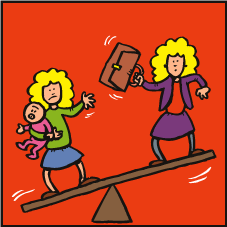Work Life Balance

Young at Heart
In 2004, the TUC (Trades Union Congress) produced a report called ‘Young at Heart?’
This report looked at the youth labour market (working people aged between 16 and 25) over the previous twenty years, and highlighted some interesting trends:
- an increase in the numbers staying on in education and training past the age of 16
- the number of college and university students working as well as studying.
Here are some of the facts and figures it contained:
Part time work
- Nearly 60 per cent of 16 and 17 year olds in full-time education also work part time
- Around 65 per cent of the 16 to 25 year old employees in pubs and restaurants work part-time
Types of work that 16 to 25 year olds are employed in
- 40 per cent work in distribution (shops, warehouses, transport), hotels and restaurants
- 16 per cent work in public administration, education and health
- 14 per cent work in banking, insurance and finance. (Less than five per cent of 16 year olds are involved in this area).
What’s it going to be like when you’re a 16 to 25 year old, then? Well, you don’t need a crystal ball to predict that there’s a strong likelihood of you:
- going to college or university full time
- having to hold down a part time job as well as studying full time to support yourself through your education.
Working part time and studying full time adds a whole new dimension to what we call work life balance, which is:
- having enough time to do what you have to do (work and responsibilities) and
- enjoying yourself too (family and social life, interests and pastimes).
So in the future, more students are going to have to learn to fit in studying too in order to
- get good results,
- make the most of the chances college or university offers and
- enter a good career at the end of it
Try to imagine what life could be like for you in a few years time:
- What kind of work, study and life balance will you hope for?
- What kind of skills will you need to have to help you cope?
- How could these skills and experiences help in your future life?